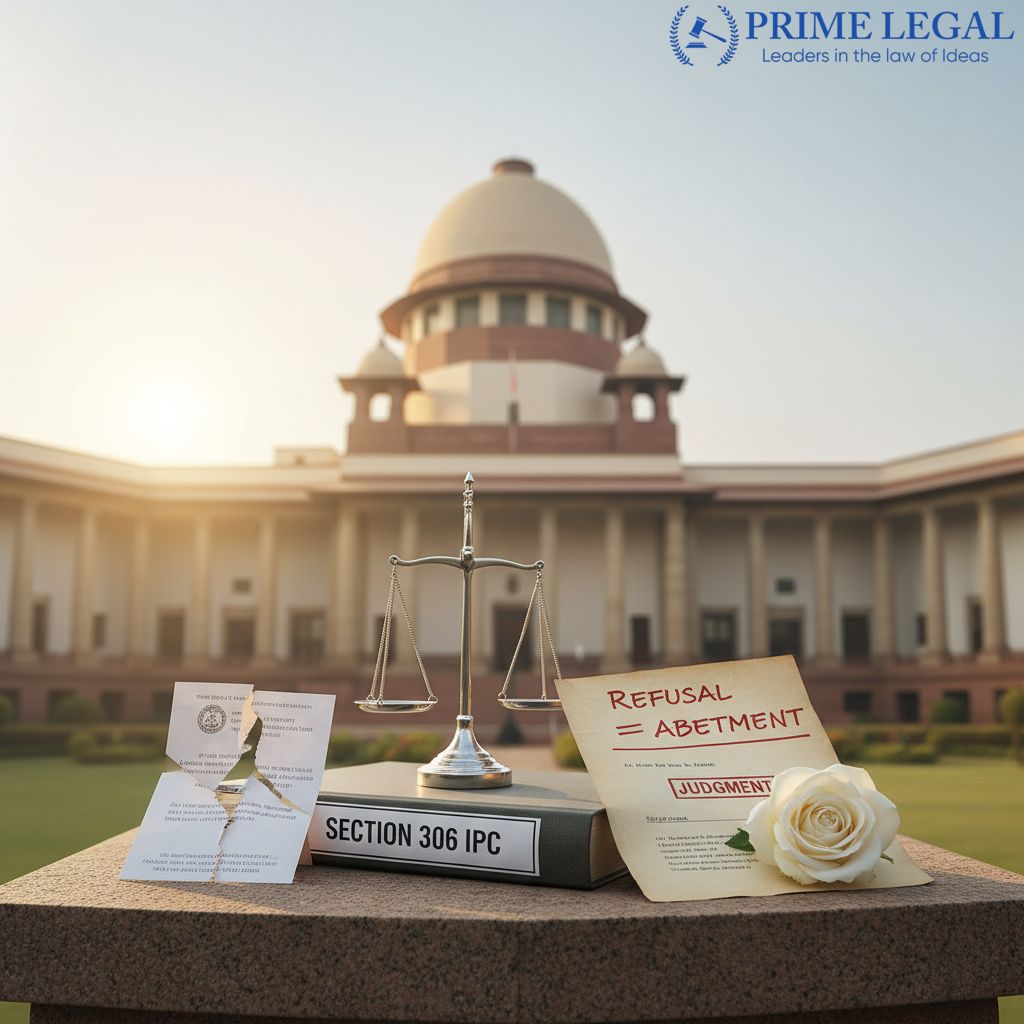CASE NAME: Yadwinder Singh @Sunny v/s State of Punjab & Anr.
CASE NUMBER : Petition for Special Leave to Appeal (Crl) No. 7309 of 2025
DATE : 27th October 2025, Thursday
QUORUM: Justice J.B. Pardiwala, Justice K.V. Vishwanathan
FACTS
This appeal arose from the judgment of the Punjab and Haryana High Court dated 17 March 2025, which dismissed a petition filed by the appellant, Yadwinder Singh @ Sunny, under Section 482 of Cr.P.C. seeking quashing of FIR No. 273/2016 registered under Section 306 of IPC. The FIR was lodged by Surinder Kaur, mother of the deceased Pardeep Kaur, a government advocate posted at Amritsar. It was alleged that Pardeep Kaur and the appellant, were in a close relationship and intended to marry. The appellant had initially assured the complainant that he would persuade his family to consent to the marriage but later backed out, causing the deceased deep emotional distress. On 6 November 2016, she consumed poison at her residence and died during treatment the same night. In her supplementary statement, the complainant further alleged that the appellant had mentally and physically exploited her daughter under the false pretext of marriage and that his refusal and callous response drove her to take the extreme step.
ISSUES
- Whether the allegations in FIR No. 273/2016 and the materials on record disclose the essential ingredients of the offence of abetment of suicide under Section 306 of the Indian Penal Code, read with Section 107 IPC.
- Whether the High Court was justified in refusing to exercise its inherent powers under Section 482 Cr.P.C. to quash the FIR and criminal proceedings against the appellant.
LEGAL PROVISIONS
-
- Section 306, IPC, 1860 : Abetment of suicide. —If any person commits suicide, whoever abets the commission of such suicide, shall be punished with imprisonment of either description for a term which may extend to ten years, and shall also be liable to fine.”
- Section 107, IPC, 1860 : Definition of Abetment: A person is said to abet the doing of a thing who instigates, conspires, or intentionally aids in doing that act.
ARGUMENTS
APPELLANT :
The Appellant represented by Ld Senior Counsel Mr. P. S. Patwalia argued that even if the allegations in the FIR and supplementary statement were accepted as true, they did not constitute the offence of abetment of suicide. The relationship between the appellant and the deceased was consensual, and her death was a result of emotional distress following the appellant’s inability to marry her due to family opposition. It was contended that a broken relationship or refusal to marry, however unfortunate, cannot amount to “instigation” or “abetment” under Section 107 IPC. The counsel further argued that there was neither any deliberate act, criminal intent, nor direct provocation by the appellant that could have led the deceased to take her own life. It was also contended that the supplementary statement introducing claims of physical exploitation and verbal provocation was an addition, influenced by emotion and not by fact. Continuation of proceedings on such vague and improved statements, it was argued, would amount to misuse of criminal law and unnecessary harassment of the appellant.
RESPONDENT:
Counsel for the State, Mr. Mohit Siwach contended that the FIR and supporting materials clearly disclosed a prima facie case under Section 306 IPC. It was argued that the appellant had taken advantage of the deceased’s trust by engaging in an intimate relationship on the false promise. The State submitted that the appellant’s conduct resulted in the deceased’s suicide. The High Court’s refusal to quash the FIR was therefore justified, as the truth of these allegations could only be determined at trial and not at the stage of quashing.
ANALYSIS
It is to be pointed out that the supplementary statement introduced new and exaggerated allegations that were absent from the original version, and this casts doubt on its reliability.The Supreme court held that although the appellant and the deceased were in a relationship and had intended to marry, his subsequent refusal due to family opposition could not, by itself, amount to abetment of suicide under Section 306 of IPC, 1860. Upon relying on its previous judgments including Nipun Aneja v. State of Uttar Pradesh, SCC OnLine SC 8 4091, Geo Varghese v. State of Rajasthan, (2021) 19 SCC 144 and S.S. Cheena v. Vijay Kumar Mahajan, (2010) 12 SCC 190 the Court observed that “instigation” under Section 107 IPC requires a clear, deliberate act intended to provoke the commission of suicide. Mere refusal to marry even if true, do not satisfy this test. It could be noted that as there was no evidence of direct incitement by the appellant, continuing the case further would amount to an abuse of the legal process.
JUDGEMENT
The Supreme Court allowed the appeal and held that FIR No. 273/2016 dated 07.09. 2016, registered at Chhehrata Police Station, Amritsar, and all consequential proceedings in Sessions Case No. 728/2018 pending before the Additional Sessions Judge, Amritsar, were quashed. The Supreme Court held that mere refusal to marry, even if true, by itself would not amount to “instigation” as contemplated under Section 107 of the IPC.
CONCLUSION
It could be concluded that this judgment reiterates that criminal liability for abetment of suicide under Section 306 of the IPC arises only when there is clear proof of an intentional and direct act of incitement. This case once again highlights that criminal law must be enforced strictly based on clear proof of guilt and not by moral or emotional appeal.
Click here to read more: YADWINDER SINGH @SUNNY v. STATE OF PUNJAB & ANR pdf
“PRIME LEGAL is a full-service law firm that has won a National Award and has more than 20 years of experience in an array of sectors and practice areas. Prime legal falls into the category of best law firm, best lawyer, best family lawyer, best divorce lawyer, best divorce law firm, best criminal lawyer, best criminal law firm, best consumer lawyer, best civil lawyer.”
Written by- Amyukta Rajagopal


